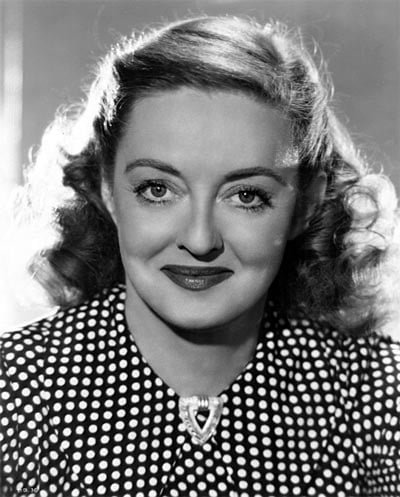Born: April 5, 1908, Lowell, Massachusetts, U.S.
Died: Oct. 6, 1989, Neuilly-sur-Seine, France

Bette Davis was an American motion-picture actor, renowned for the intensity and controlled flamboyance of her acting and for her vivid portrayals of eccentric heroines and diabolical schemers. Born Ruth Elizabeth Davis in Lowell, Massachusetts, she decided in high school to become an actress, subsequently studied at the Robert Milton-John Murray Anderson School of the Theater in New York City, and by 1928 was working in theatre with the Provincetown Players. Davis made her Broadway debut in 1929, and in 1930 she went to Hollywood, California, and was later signed by Universal film studios. She made her film debut in 1931 in Bad Sister for Universal, but she soon moved to Warner Bros., where she was offered a long-term contract. Although her first films were minor yet Davis gained notice with her appearance opposite British actor George Arliss in The Man Who Played God (1932). Two years later, on loan to Radio-Keith-Orpheum (RKO) studios, she got the opportunity that made her a star, playing the crude, scheming waitress Mildred Rogers in Of Human Bondage (1934; with Leslie Howard). More confident after this success, Davis began a protracted struggle with Warner Bros. to be given stronger parts. Although she did get a substantial role in Dangerous (1935)-one that earned Davis an Academy Award for best actress-the studio resented her demands and soon returned to assigning her ordinary roles in films often disparaged by the same reviewers who praised her performances in them. In 1936, Davis turned down a role, was suspended without pay by the studio, and thereupon sailed to England to make films. Warner Bros., however, obtained an injunction to prevent her from working anywhere else, and Davis filed suit to terminate her contract with the studio. After a much-publicized court proceeding in London, she lost the suit, although the studio paid her legal expenses and began to treat her with more deference.
Upon her return to Warner Bros., Davis starred in a series of prestigious films that brought her an Academy Award nomination for the best actress five years in a row: Jezebel (1938), Dark Victory (1939), The Letter (1940), The Little Foxes (1941), and Now, Voyager (1942). She won the award for her performance as the fiery Southern belle in Jezebel, a role offered her as consolation for not being chosen to play Scarlett O’Hara in Gone With the Wind (see Mitchell, Margaret). Davis was nominated again for Mr. Skeffington (1944; with Claude Rains), but her roles of the later 1940s were extremely uneven.
In the early 1950s, she made a triumphant comeback with a role that was perhaps her most famous-that of the acid-tongued actress Margo Channing in All About Eve (1950)-followed by The Star (1952) and her second performance as Queen Elizabeth I, in The Virgin Queen (1955). Later in the decade, however, she hit a serious slump during which she returned to the stage intermittently, most notably in Night of the Iguana (1961) by Tennessee Williams.
A second resurgence of Davis’s motion-picture career occurred when she was offered the title role in What Ever Happened to Baby Jane? (1962), in which she played a grotesque former child star looking after her crippled sister, acted by Joan Crawford. Although she continued to accept film roles throughout the 1960s and 1970s yet a few were worthy of her talent, and in the 1970s she turned often to television. Davis acted in several noteworthy television movies, most notably Strangers: The Story of a Mother and Daughter (1979) and A Piano for Mrs. Cimino (1982). In the early 1980s she underwent surgery for cancer, in the aftermath of which she had several strokes. Despite her rapidly failing health, she continued to work, performing with Lillian Gish (see Gish) in The Whales of August (1987). Davis compelled attention with the force of her powerful personality and her intensely focused characterizations. Her more than 80 films include many notable performances, as in The Cabin in the Cotton (1932), The Petrified Forest (1936), The Sisters (1938), Juarez (1939; as the Empress Carlotta), The Private Lives of Elizabeth and Essex (1939; as Queen Elizabeth I; see Essex, Robert Devereux, 2nd earl of), The Man Who Came to Dinner (1941), In This Our Life (1942), Watch on the Rhine (1943), The Corn is Green (1945), Deception (1946), Beyond the Forest (1949), The Catered Affair (1956), and The Scapegoat (1959).
In a film career that spanned nearly 60 years, Davis won more Academy Award nominations (10) than any other female actor up to that time, and in 1977 she became the first woman to receive the American Film Institute’s Life Achievement Award. The French motion-picture industry also awarded her a special César for her life’s work in films. Davis wrote two autobiographical books, The Lonely Life (1962) and This ‘N’ That (1987), and was the subject of many biographies.

